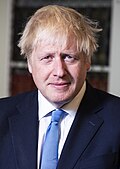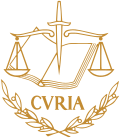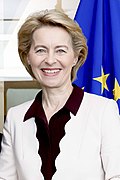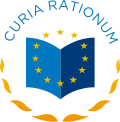Portal:European Union
Introduction
The European Union (EU) is a supranational political and economic union of 27 member states that are located primarily in Europe. The union has a total area of 4,233,255 km2 (1,634,469 sq mi) and an estimated population of over 449 million as of 2024. The EU is often described as a sui generis political entity combining characteristics of both a federation and a confederation. Containing 5.5% of the world population in 2023, EU member states generated a nominal gross domestic product (GDP) of around €17.935 trillion in 2024, accounting for approximately one sixth of global economic output. Its cornerstone, the Customs Union, paved the way to establishing an internal single market based on standardised legal framework and legislation that applies in all member states in those matters, and only those matters, where the states have agreed to act as one. EU policies aim to ensure the free movement of people, goods, services and capital within the internal market; enact legislation in justice and home affairs; and maintain common policies on trade, agriculture, fisheries and regional development. Passport controls have been abolished for travel within the Schengen Area. The eurozone is a group composed of the 20 EU member states that have fully implemented the EU's economic and monetary union and use the euro currency. Through the Common Foreign and Security Policy, the union has developed a role in external relations and defence. It maintains permanent diplomatic missions throughout the world and represents itself at the United Nations, the World Trade Organization, the G7 and the G20. Due to its global influence, the European Union has been described by some scholars as an emerging superpower.[needs update] In 2012, the EU was awarded the Nobel Peace Prize. In 2020, the United Kingdom became the only member state to leave the EU; ten countries are aspiring or negotiating to join it. (Full article...) Selected article The euro (currency sign: €; currency code: EUR) is the official currency of the European Union (EU). Nineteen member states have adopted it, known collectively as the Eurozone (Austria, Belgium, Cyprus, Estonia, Finland, France, Germany, Greece, Ireland, Italy, Latvia, Lithuania, Luxembourg, Malta, the Netherlands, Portugal, Slovakia, Slovenia, Spain). The currency is also used in five further countries with formal agreements and six other countries without such agreements. Hence it is the single currency for over 320 million Europeans. Including areas using currencies pegged to the euro, the euro directly affects close to 500 million people worldwide. With more than €610 billion in circulation as of December 2006 (equivalent to US$802 billion at the exchange rates at the time), the euro is the currency with the highest combined value of cash in circulation in the world, having surpassed the U.S. dollar (USD). Taking official estimates of 2007 GDP, the Eurozone is the largest economy in the world by March 2008 after the USD/EUR exchange rate surpassed 1.56. The euro was introduced to world financial markets as an accounting currency in 1999 and launched as physical coins and banknotes on 1 January 2002. It replaced the former European Currency Unit (ECU) at a ratio of 1:1. The euro is managed and administered by the Frankfurt-based European Central Bank (ECB) and the Eurosystem (composed of the central banks of the euro zone countries). As an independent central bank, the ECB has sole authority to set monetary policy. The Eurosystem participates in the printing, minting and distribution of notes and coins in all member states, and the operation of the Eurozone payment systems. Selected picture
Photo credit: Nattfodd The top of Mont Blanc, the European Union's highest mountain, seen from the Gare des Glaciers.Did you know?...that within the Eurozone the European Central Bank has the exclusive authority to set monetary policy? ...that Greenland and United Kingdom are the only countries to ever leave the European Union? Selected cityBrussels is the capital of Belgium, of the French Community of Belgium, of the Flemish Community, and is the headquarters of the European Union's institutions. Brussels is in the centre of Belgium, and also the largest municipality of the Brussels-Capital Region. This municipality inside Brussels is correctly named The City of Brussels, which is one of 19 municipalities that make up the Brussels-Capital Region, with a total population of 1,018,804 inhabitants (1 January 2006). The municipality has a population of about 140,000. The Metropolitan area has about 2,090,000 inhabitants. Brussels is also the political seat of NATO, the Western European Union (WEU) and EUROCONTROL, the European Organisation for the Safety of Air Navigation. In 977 AD, the Holy Roman emperor Otto II gave the duchy of Lower Lotharingia on the empire's western frontier to Charles, the banished son of King Louis IV of France. Mention was already made of Brussels at the time: Bishop Saint-Gery of Cambrai-Arras settled a chapel on a small island (695). However, the founding of Brussels is usually said to be when a small castle was built by Charles around 979 on Saint-Géry island in the Zenne or Senne river. General imagesThe following are images from various European Union-related articles on Wikipedia.
TopicsFeatured contentFeatured articles
Featured lists
Featured contentGood articles
CategoriesRelated portalsAssociated WikimediaThe following Wikimedia Foundation sister projects provide more on this subject:
Discover Wikipedia using portals |


































































